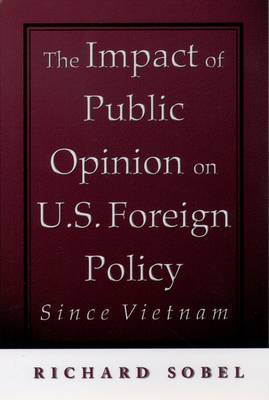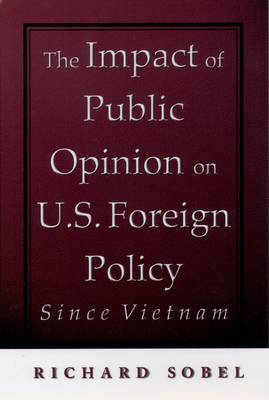
- Afhalen na 1 uur in een winkel met voorraad
- Gratis thuislevering in België vanaf € 30
- Ruim aanbod met 7 miljoen producten
- Afhalen na 1 uur in een winkel met voorraad
- Gratis thuislevering in België vanaf € 30
- Ruim aanbod met 7 miljoen producten
Zoeken
€ 200,45
+ 400 punten
Omschrijving
How strongly does public opinion affect the making of U.S. foreign policy? In The Impact of Public Opinion on U.S. Foreign Policy Since Vietnam, Richard Sobel provides a compelling answer to this provocative question that has long stirred spirited debate among scholars, activists, and policymakers. The book explains how public attitudes have affected the making of U.S. foreign policy. It also explores the tension between theoretical views of what the role of public opinion should be in a democracy and the actual historical records. Focusing on four of the most prominent foreign interventions of the last generation--the Vietnam War, the Nicaraguan contra funding controversy, the Persian Gulf War, and the Bosnia crisis--the book demonstrates that public opinion constrained but did not set American foreign policy. The cases provide detailed information on the events, public attitudes, and policies for each of these four major U.S. conflicts. Sobel supports his argument with insights drawn from the words of decision-makers in public statements, records, and memoirs, as well as from interviews with three former secretaries of state and four former secretaries of defense. The book also explores how public sentiment about a specific crisis emerges over time and how it is often tied to the climate of interventionist and noninterventionist opinion. Clearly written, The Impact of Public Opinion on U.S. Foreign Policy Since Vietnam is an essential text for courses in American government, public opinion, political behavior, and American foreign policy. It will also have strong appeal to scholars, policy makers, and general readers who are interested in gaining a deeper understanding of the politics behind the most significant conflicts of recent times.
Specificaties
Betrokkenen
- Auteur(s):
- Uitgeverij:
Inhoud
- Aantal bladzijden:
- 288
- Taal:
- Engels
Eigenschappen
- Productcode (EAN):
- 9780195105285
- Verschijningsdatum:
- 1/03/2001
- Uitvoering:
- Paperback
- Formaat:
- Trade paperback (VS)
- Afmetingen:
- 162 mm x 235 mm
- Gewicht:
- 408 g

Alleen bij Standaard Boekhandel
+ 400 punten op je klantenkaart van Standaard Boekhandel
Beoordelingen
We publiceren alleen reviews die voldoen aan de voorwaarden voor reviews. Bekijk onze voorwaarden voor reviews.











